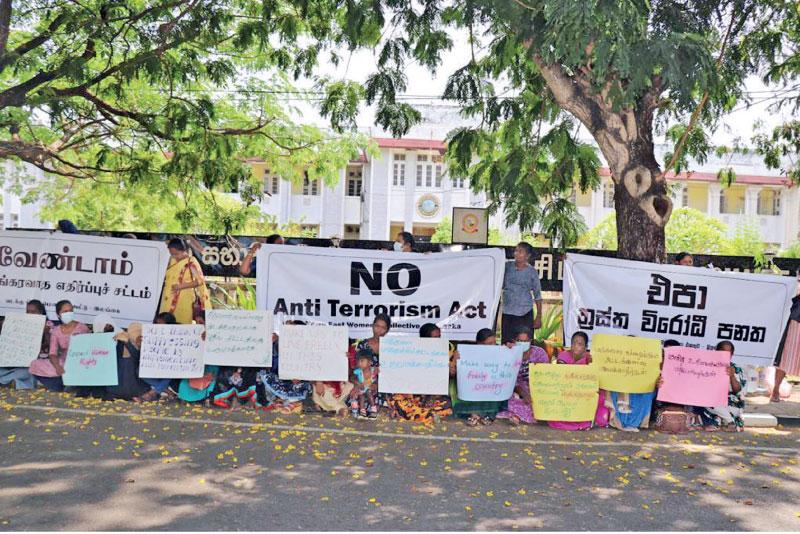07 Oct 2023 - {{hitsCtrl.values.hits}}

North East Tamils protests against Anti Terrorism Act (File photo)
 The most dangerous feature of the present Bill is that in effect it grants extraordinary powers to an already over mighty Executive President and the military, police and the Attorney General to define terrorism and use the powers bestowed under the Bill to suppress legitimate democratic activity and dissent
The most dangerous feature of the present Bill is that in effect it grants extraordinary powers to an already over mighty Executive President and the military, police and the Attorney General to define terrorism and use the powers bestowed under the Bill to suppress legitimate democratic activity and dissent
The National Christian Council of Sri Lanka (NCCSL) has expressed its deep concern over the proposed Online Safety Bill and the Anti-Terrorism Bill and had explained the adverse effects they would have on the democracy and freedom of speech.
Signed by Rt. Rev. Dr.V.Pathmathayalan – Bishop of the Jaffna Diocese of South India and Chairperson- NCCSL, Rt. Rev. Dushantha Rodrigo – Bishop of Colombo, Church of Ceylon, Rt. Rev. Nishantha Fernando – Bishop of Kurunegala, Church of Ceylon, Rev. Ebenezer Joseph – President, Methodist Church of Sri Lanka and Rev. Shirley Faber – President, Christian Reformed
Church, Rev. Wilee Ranasinghe – President, Sri Lanka Baptist Sangamaya, Rev. Saman Perera - Moderator, Presbytery of Sri Lanka, Col. Nihal Hettiarachchi – Territorial Commander, Salvation Army Sri Lanka, Rev. Chrissokumar Handy – Superintendent/Chair – Assemblies of God, Rev. Harim Peiris – Acting President, Foursquare Gospel Church, issuing separate statements on the two bills that were debated in the parliament, the NCCSL has urged the government to withdraw the two proposed legislations.
In its statement the NCCSL expressed its strong opposition to the Anti-Terrorism Bill that was gazetted on 15 September 2023. It stated as follows “The Bill which was supposed to address the concerns expressed by civil society and human rights groups when it was first made public in March 2023 has not addressed the main concerns and also retains most of the obnoxious features of the draconian Prevention of Terrorism Act of 1979.
The most dangerous feature of the present Bill is that in effect it grants extraordinary powers to an already over mighty Executive President and the military, police and the Attorney General to define terrorism and use the powers bestowed under the Bill to suppress legitimate democratic activity and dissent. The Bill, like the previous draft and the PTA, provides for woefully inadequate checks and balances of such sweeping executive powers, including through judicial oversight and review.
“The Bill’s overbroad definition of terrorism will, as has been done under the PTA, will target dissent and rights to expression, assembly and association. It grants broad powers to the police, armed forces and coast guard to search, question, seize, arrest and for the police to remove suspects out of remand custody and apply for broad orders against the public to prevent freedom of movement, travel, rallies, suspend public transport. It also gives broad powers to the president to proscribe, seek restriction orders, declare curfew, designate prohibited places, run rehabilitation programmes, make regulations and give directions.
“It is ironic that when there has been a broad consensus for the abolition of the executive presidency due to the excessive powers granted to the office under the Constitution, new laws that vest additional sweeping discretionary powers in the office have been submitted to Parliament.
We agree with the Human Rights Commission of Sri Lanka’s statement on February 15, 2022, that the ATA must be withdrawn or defeated in parliament, and the PTA must be repealed (abolished) and not be reformed or replaced. If necessary, new offences could be introduced to the penal code, after extensive consultations within the country and with relevant local and international experts,
and in keeping with international human rights norms,”.
Issuing a separate statement on the proposed Online Safety Bill (OSB) NCCSL asked the government to withdraw it forthwith.
27 Dec 2024 4 minute ago
27 Dec 2024 19 minute ago
27 Dec 2024 31 minute ago
27 Dec 2024 35 minute ago
27 Dec 2024 39 minute ago